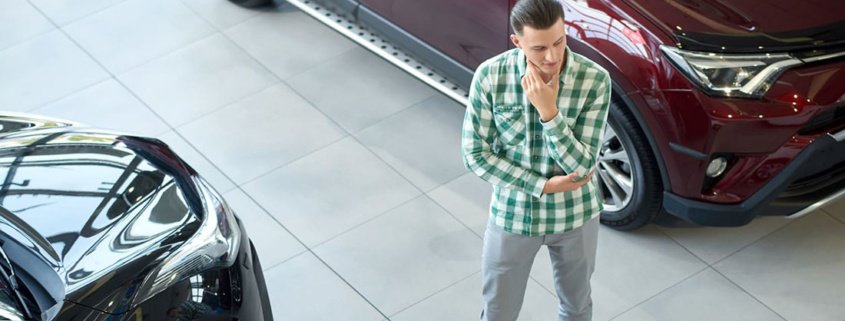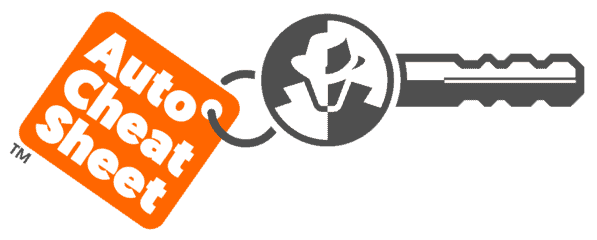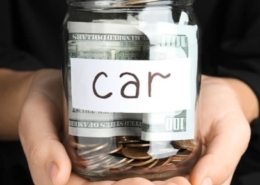Before Buying a New Car Ask Yourself These 12 Questions
Next to buying a home, a vehicle is usually the second largest purchase a person will make in their lifetime.
It’s easy to get excited, but first, take a deep breath and ask yourself a few questions to make the car buying process a lot more enjoyable.
Table of Contents
- 12 questions to ask yourself before buying a car
- 1) Do you need to buy a new car?
- 2) Can you afford a new car?
- 3) What kind of car should you buy?
- 4) Should you buy a new or used car?
- 5) What do you like about your current vehicle?
- 6) What do you dislike about your current car?
- 7) Will the vehicle fit in your garage?
- 8) Will all the drivers be comfortable?
- 9) How’s your credit history?
- 10) Do you have a down payment?
- 11) Will your family grow?
- 12) How many people can fit in the vehicle?
Answer These Twelve Questions Before Buying a New Car
There is no lack of choices when it comes to buying a new car. It can also be hazardous to walk into a dealership and not have a good idea and understanding of what you want to buy. You can narrow down your choices with a bit of soul-searching.
Before you jump in the car and head to the closest dealership, ask yourself these 12 questions, and you’ll be on your way to buying your dream car.
1) Do You Really Need to Buy a New Car?
Sometimes people get so emotionally wrapped up in the euphoria of buying a new car they tend to make some terrible decisions. Dealers and salespeople know this and will prey on this weakness to pad their pockets.
If you ever catch yourself justifying something or rearranging your finances to buy a car, it’s time to step back, take a deep breath, or even walk away if needed. The vehicle will still be there tomorrow; if it’s not, I promise – The manufacturer will make more!
Before you decide to go to a car dealership and let some smooth-talking car salesperson like myself talk you out of your hard-earned cash. Slow down and ask yourself a few questions first.
2) Can You Afford a New Car?
Most financial advisors and experts in the field say that your car payment should be no more than 10% of your gross monthly income on a 48-month term after putting down at least 20% of the purchase price.
An example would be if you make $3,500 a month (before taxes), your max payment would be $350. Your total purchase price before taxes, interest, and money down would be $16,800.
On the other hand, most lenders will take 20% of your gross monthly income to determine how much car payment you can afford. If you make $3,500 monthly, your max payment can be no more than $700. As you can see, this can be very dangerous for your financial well-being.
My advice is to make a personal budget of all your expenses and determine what you can comfortably afford with some money left over for you to enjoy. Once you have a max payment and have saved a little cash down, pick a vehicle that fits within or below your budgeted amount.
Buying a new car will bring some added expenses to your budget, especially if you don’t currently own one. It would be best if you took the time to budget these into your ownership costs; some of these costs include:
- Car Payment
- Fuel
- Car Insurance
- Tags
- Preventive Maintenance
- Repair Costs
- Emergencies
Considering these additional car ownership costs will allow you to enjoy your new car without stressing over how you will pay for it.
3) What Kind of Vehicle Should You Buy?
The vehicle choices out there are almost overwhelming. There are many different manufacturers, makes, and models to choose from; where do you start?
First, ask yourself your driving needs and, more importantly, what do you like? If you’re single with no plans to get married and like to go fast, you may want to go the sports car route. Understand that insurance and fuel costs may be higher, but that’s just part of ownership costs.
Will you be towing a boat or trailer? You may want to look into the towing capacity of pickups. I’ve seen many people buy vehicles only to find out later it’s not rated to tow what they need. Continuing to tow or haul too much weight, you’re guaranteed to mess up a vehicle quickly.
Several free online consumer automotive services allow you to research and compare vehicles online. Using these websites will help you narrow down your search without wasting time driving all over town and having to haggle with pushy salespeople.
Online automotive research sites are the best if you’re testing the waters, pre-shopping, or want to buy a new car. They’ll provide valuable information to help you do reliable research to make a good car buying decision. You can also use them to request free, no-obligation price quotes from dealers in your local area to get a feel of the market on the vehicle you’re considering.
Once you find a vehicle you’d like to buy; use trusted online car buying websites such as Ryde Shopper, Edmunds, Cars Direct, and MotorTrend. These companies allow you to acquire free price quotes and learn how to start a new car price bidding war between dealers to guarantee you pay the lowest price.
4) Should You Buy a New or Used Car?
Buying a new car will provide you peace of mind with a factory warranty and knowing that you’re the first one to own the vehicle. New cars are usually more expensive and depreciate faster over the first couple of years of ownership.
You can buy a used car, the same car with just a few miles on it, and save a lot of money. With a used car, the previous owner takes the initial depreciation hit and leaves you with savings upward of a few thousand dollars. You’ll often find that you can buy a used car with more bells and whistles cheaper than you can buy the exact vehicle now.
Suppose you decide to purchase a used car over a new one. Ensure you have the vehicle inspected by an independent certified mechanic and review the vehicle history report.
If you purchase a used car, you’ll most likely want to protect your investment with an extended auto warranty. Most dealers will offer some protection for a cost. As with vehicle pricing, you should always compare vehicle pricing online to get the best price.
You can request free extended auto warranty quotes from trusted online companies such as Complete Car Warranty and Endurance Vehicle Protection.
Buying a new or used car is really up to what you want and can afford. You can get a whole lot more cars for the money if you buy used. Some people like the peace of mind that comes with buying a new car and don’t mind paying for it. Whether the vehicle is new or used, it will be unique to you!
5) What Do you LIKE About Your Current Car?
This is a great question to ask yourself. You’ve been driving your current car for a while now. What are the things you like about it? What made you buy the vehicle in the first place? The way it handles, the safety features, the gas mileage, the way you look, etc.
Write them down and keep them for when shopping for your new car.
6) What Do You DISLIKE About Your Current Car?
Buying a new car allows you to get away from the things you dislike about your current vehicle. Think about the things you dislike about it. Too big, too small, lack of power, no sunroof, maintenance repair costs, blind spots, hard to park, the way you look in it, etc.?
Write these down also so you can remember what you don’t want when buying a new car.
7) Will the Vehicle Fit in Your Garage?
This may sound like a funny question to ask yourself, but it does happen occasionally. It’s one of those OMG moments, and by the time you find out, it’s too late.
The Ford Excursion upset many people once they discovered they couldn’t fit it in their garage after already buying it. If you’re in the market for a large truck or SUV, take some measurements if you plan to park it inside.
The above principle applies to towing capacity. If you plan on pulling something, make sure you buy a vehicle rated to tow or haul, or you could destroy the car over time.
8) Will A Drivers Be Comfortable in the Car?
A Toyota Prius would be a nice little car with good gas mileage. However, if your spouse is 6’6″, he may have a problem driving or riding comfortably in your tiny compact car.
A Ford Expedition would be a nice big SUV to fit the entire family in; however, your 5’2″ wife may have difficulty parking it or driving it within a big city.
These scenarios may not be typical; however, you should think of everything when it comes to spending a lot of money on something your significant other will not want to drive. Who would buy a car without their husband or wife? Believe it or not, many people do.
9) How’s Your Credit Score and History?
If you have some bumps in your credit history, you will have to pay a higher interest rate and essentially pay more for the vehicle if you’re financing it. Before applying for any loan, you should always get and review your credit reports and scores.
You can get your credit report, score, and history from a reputable online company such as MyFreeScoreNow. They are a trusted leader in the industry. Doing this will give you negotiating leverage with a dealership and keep you from becoming victims of any modern car dealer scams.
Once you receive your credit history, bring any current loans or credit cards past due to current status. Pay off any outstanding collections, liens, or judgments. These bumps in your credit history will hurt you and cause you to pay a higher interest rate.
Cleaning up these bad marks on your credit report will help increase your credit score and put you in a better position by receiving a lower interest rate when applying for your next car loan.
The finance department in a dealership is a high-profit center. Many people let their guards down once they’ve agreed to the purchase price of a car. Going into the finance portion of buying a car can cost you thousands of dollars if you’re not prepared.
Having a little knowledge about how automotive finance works will help you greatly when it comes to visiting the finance department.
10) Do You Have a Down Payment?
It may be attractive not to put any money down if you have the credit score and history to support it. However, you may want to put some thought into it first. I have always recommended you put at least 20% down on the purchase price of the vehicle. Doing this will significantly reduce your chances of becoming upside down and the amount of money you’ll pay in interest charges.
20% is a large amount of money for some people. If you cannot put down 20%, at the very least, put down the amount of tax, title, license, or any extra fees associated with your state. Paying interest charges on TT&L is just crazy.
If you have bad credit, you may have to come up with a minimum of 10% down or more of the vehicle’s purchase price.
Please read my article on how much cash you should put down on a new car to learn more about the pros and cons of having a large down payment when buying a new vehicle.
11) Will Your Family Grow?
You would be surprised how often people overlook this question while buying a car.
It’s easy to get overwhelmed with the shiny new sports car sitting on the showroom floor. The car salesman then proceeds to show you how easy it is to buy it, and you think to yourself how good you’ll look driving it. But wait, you came in for a four-door sedan.
Ask any mom lifting an infant into or out of a car seat from the backseat of a 2 door vehicle, and I can promise you they’ll tell you it’s a major chore.
Think twice about your and your family’s future before buying a vehicle that does not have enough room or doors. Your spouse may be very unhappy with your vehicle selection.
I don’t think I need to say anything more about this subject.
12) How Many People Will Ride in Your Car?
This question is an extension of the above question. What will be your driving habits with your new car? Do you have a family of six and need a vehicle to take everyone on vacation? Do you haul people all the time? Do you need a car just to run quick errands or go to and from work?
I somewhat repeated this question because of its importance. Over my career, I’ve witnessed people by the wrong car for their family time and time again. Once you buy a car, even if it’s not right, you will not be in a good position if you have to return or trade the vehicle.
Take the time to do your research upfront and buy the right car the first time. Take this question seriously, give it a little thought, and don’t buy a car that’s too big or small for your family!










